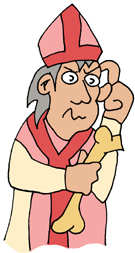|

|
|

in Saxon England
& the Rest of Britain

|
- Some
Christians spent their whole lives praying and doing good
things. They might be missionaries,
hermits, monks
or nuns or promoters of the Church (British
or Saxon). Some of them were
later thought to be special people and were called saints.
- When saints died, people thought
that touching their grave, their dead body or their
possessions would cure them
of all sorts of diseases and afflictions. Some Christians
still believe this.
- The saints' bones and belongings
they once owned were called 'relics'. They were kept in elaborate caskets or monuments called
'shrines'.
- Hand-held bells were popular
relics of British Saints. In Scotland, they were often crosiers
(staffs of office).
- Individual bones were often swapped with other churches.
Saxon Kings and Bishops collected
relics as a hobby. They usually kept them in a church crypt.
- Churches with shrines
were visited by lots of people hoping for cures. They are
called 'pilgrims'. The visit is called a 'pilgrimage'.
- Pilgrims gave money to the monks
or bishops who looked after shrines. They became very rich.
- Relics and Pilgrimages became
even more popular in medieval
times.
- Activity
Sheet available.
|
|

